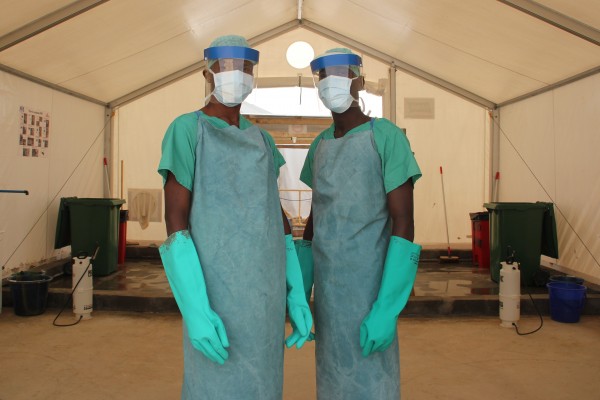This is a guest blog post from Andreas Hübers, ONE’s Interim Policy Director, Health.
Just hours after the WHO declared West Africa free of Ebola transmission yesterday, Sierra Leone officials have confirmed a new death from Ebola. Sierra Leone had been declared free of transmission already on November 7, and yesterday, an “all-clear” was finally given for the whole region. In line with WHO procedures, this came 42 days after the two most-recent cases received a second consecutive negative test for the virus. But tragically, the celebration lasted only hours.

A burial team is lowering the body of a suspected Ebola victim into a grave in a new cemetery in Liberia at the start of the outbreak. The burial site was opened on 23 December 2014 in the Disco Hill district to ensure that Ebola victims from Monrovia and the surrounding counties could be buried in a safe and dignified way. Photo: UNMEER/Martine Perret
This is another reminder of the continued fragility of the situation—something we have seen time and time again since the first case emerged in March 2014. Take Liberia: The country had been declared clear of Ebola twice before yesterday’s announcement, but the virus returned in November 2015, just like in Sierra Leone now. There is, however, an important difference between the outbreak in 2014 and the case in Sierra Leone now: Health officials are now much more prepared for this eventuality and better equipped to contain the disease.
Putting the preparedness of health officials aside, the ease with which Ebola flares up again raises some simple questions: Do we want to firefight Ebola outbreaks, switching between red and green like a traffic light? Do we want to take the selfless heroism of frontline health workers for granted? Or, do we want to tackle the disease and its root causes for good?

The student sprayers keeping medics safe from Ebola in Makeni, Sierra Leone. Lamin Koroma and Suley Kamara were both at university before joining the team at the British-built Makeni Ebola treatment centre. The pair play a vital role in keeping the medics at Makeni safe as they exit from the wards – spraying them down with chlorine to kill the virus and helping to guide them through the careful removal of their safety suits. Photo: DFID
There are three key points we need to remember and to take action upon to make sure the effort to fight the transmission of Ebola is successful:
- We need to keep fighting Ebola, and be ready for future cases. We haven’t eradicated the disease nor has a cure been found yet. The disease is out there, and vigilance needs to remain high—not just in West Africa but globally. We are aware that Ebola may always return, and we need to prioritize the development of vaccines and other diagnostics whether Ebola is in the news or not.
- Strengthening health systems is paramount. When the epidemic first broke, Liberia had three health care workers per 100,000 inhabitants. This figure needs to be doubled, triple, quadrupled—brought to the same levels as in developed countries to ensure that a robust defense against epidemic outbreaks exists. But the solution needs to be bigger: Epidemics’ best friends are ill-equipped schools and insufficient and unbalanced nutrition, as well as weak infrastructure. Comprehensive, long-term development is needed in West Africa and other vulnerable countries to ensure that communities and countries are strong enough to fight Ebola and other outbreaks.
- We need better financial accountability – from all governments. West African countries need to invest more—and more transparently—in their economies and essential services. Likewise, donor governments need to reframe how they financially prepare for and disburse funds in a crisis. Certainly, one of the most basic, fundamental questions many actors need clarity on during a crisis is, “How much have donors delivered to this effort?” Our work on tracking relief efforts to Ebola highlighted many ways in which donors and the international system must improve transparency and accountability of resource flows in times of crisis. Such clarity about aid flows and holding leaders and implementers accountable for delivery can be a matter of life or death.
ONE will continue to work with partners to make sure we’re doing all we can to get resources to where they are most needed so that one day West Africa and beyond will be Ebola free.
